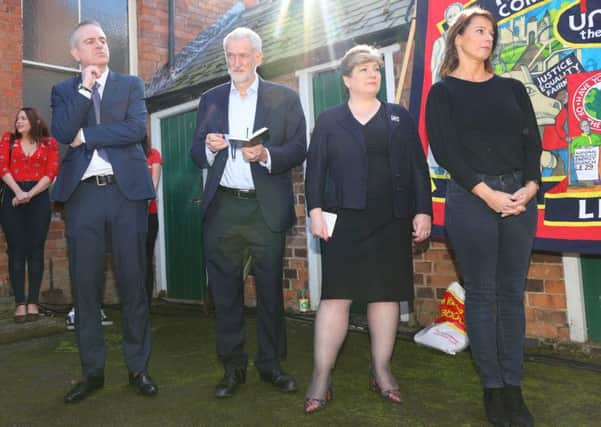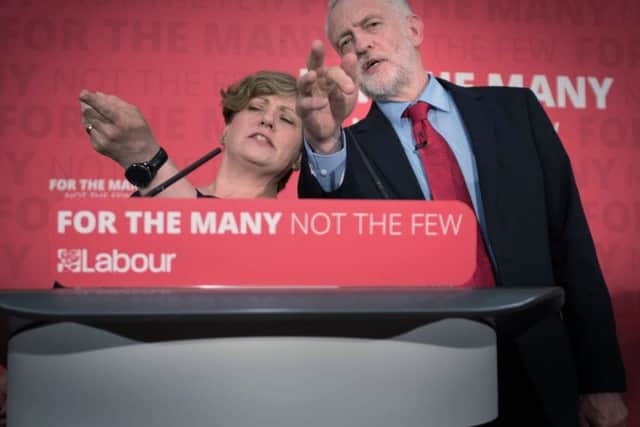Matthew Flinders: Emily Thornberry’s rant against departing MPs just proved their point


Brexit is not to blame. It simply emerged as the symptom of a far deeper democratic malaise: the failure of our political parties to keep pace and connect with a rapidly-changing society. A gap between the governors and the governed emerged and a situation defined by uncertainty and flux has become the ‘new normal’.
As such, Brexit has become the lightning-rod for public frustration and the dilemma faced by both party leaders is how to prevent it from rupturing their parties right down the middle.
Advertisement
Hide AdAdvertisement
Hide AdIf the fabric of British party politics has been fraying for some time then last week the first clear tear emerged as eight MPs left the Labour Party to join a new Independent Group and were quickly followed by three from the Conservative Party. Since then, the main focus of public debate and media commentary has understandably been on the chances of this new grouping sustaining some momentum (not thatMomentum).


And yet this focus is arguably a little too obvious. Surely the bigger question revolves around the capacity of the two main parties to pick-up on – and address – the deeper signals and concerns that these departing MPs were so desperately trying to send to them. Put slightly differently, what evidence is there that either party possesses the emotional intelligence to reflect and react in a constructive manner?
Possibly over-simplifying a complex reality, it is possible to suggest that the main criticisms of the departing Labour (now independent) MPs was that the party had lurched to the left in a manner that had become narrowly tribal, often aggressive, intolerant of internal questioning, unable to deal with accusations of anti-Semitism and prone to a style of party management that was interpreted by many as synonymous with bullying. These are serious accusations that have been around for some time and were now brought into sharp relief by the creation of The Independent Group.
So how did the Labour Party leadership respond? Anyone watching Shadow Foreign Secretary Emily Thornberry’s speech last weekend to the good people of Broxtowe – coincidentally where Tory-cum-Independent Anna Soubry is MP – would be hard pressed not to conclude that it responded in a manner that appeared to be almost designed to sustain almost all of the accusations and criticisms that had been levelled at the Labour leadership.
Advertisement
Hide AdAdvertisement
Hide AdThis was world-class tribalist populism of the lowest order. “We would rather die than join any other party and we would never think of joining the other eight people who have decided to abandon Labour and cuddle up to the Tories,” she said. You really cannot beat a good old bit of ‘death before betrayal’ rhetoric to whip-up a crowd and it didn’t take long for Ms Thornberry to talk of ‘abandonment’ and ‘betrayal’ and how the miscreants would be ‘crushed’ if by-elections were held. With a worrying slip into the royal ‘we’ that denied any possibility that the audience might have views that departed from her own, she then declared: “We are Labour to our core and Labour to the tips of our fingerprints!”
Yes, apparently the MP’s fingerprints magically spell out the words “Labour Party”.
It was laughable but also slightly sad. Especially when the hyperbole slipped into vindictive personal mockery. These MPs, Ms Thornberry explained to the crowd, had all benefitted at the last general election from the leadership of Jeremy Corbyn. How else could their success be explained? “Maybe Gavin Shuker got himself a new haircut?” she asked the crowd. “Maybe Mike Gapes got himself some new glasses?” Playground politics now in overdrive… “Maybe Chuka had been to a new tailor?”
Advertisement
Hide AdAdvertisement
Hide AdThis was all good tub-thumping stuff and I’m sure it is water off a duck’s back to those that have left the party but there is arguably a deeper and potentially darker side to this performance – it’s exactly what all the research suggests the public are totally fed up with. Tribal tit-for-tat personalised negative politics with a populist twist. The British public simply don’t like it or buy it. They are far too good for it and so should their politicians be.
Almost beyond irony, it was a performance that managed to demonstrate everything that the ex-Labour members of the Independent Group sought to bring to the fore. The odd thing is that the leader of the Labour Party was also at the event. Leaders need to lead. There is no point denouncing bullying and promoting civility if senior members of your team don’t take those values to heart… or “right to the tips of their fingerprints”.
Matthew Flinders is Professor of Politics and Founding Director of the Sir Bernard Crick Centre for the Public Understanding of Politics at the University of Sheffield. He is also President of the Political Studies Association of the United Kingdom.